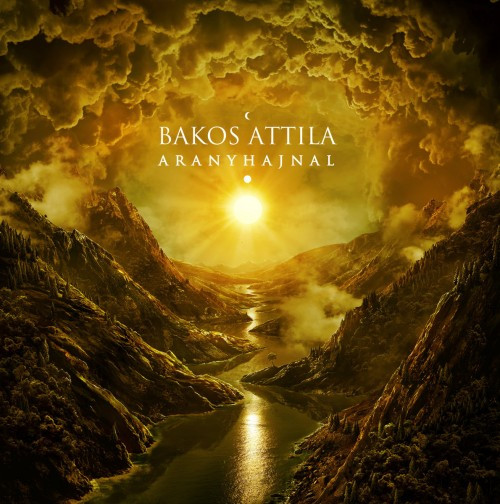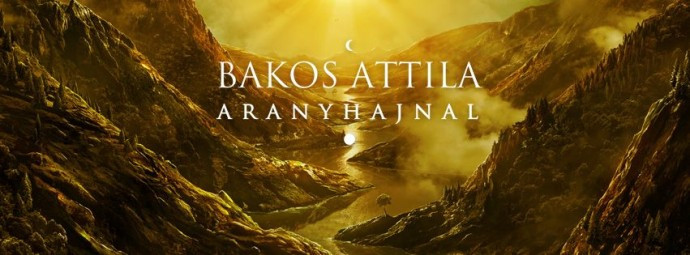This album is an exception to some of our “rules”, including that main one reflected in our site’s title. I doubt that I would have delved into it but for the fact that I knew the name of its lone creator, Attila Bakos, because of his striking vocal contributions to two exceptional albums by the Hungarian band Thy Catafalque — Róka hasa rádió (2009) and Rengeteg (2011) — and even more specifically, because of his contribution to a song from the latter album that to this day remains one of my most-listened-to metal songs — “Fekete mezők”.
But Aranyhajnal (which means “golden dawn”) is not only exceptional as a subject for commentary at our site, it is also exceptional as a collection of music — as spellbinding and beautiful as the artwork by Gyula Havancsák that graces its cover.
Before turning to the music, there may be some confusion about the name of the band. My understanding is that Hungarian names consist of a family name followed by a given name, and so if I’m right about that, Bakos Attila is the artist’s name as it would be used in Hungarian, though in most writing outside Hungary he is referred to (and often refers to himself) as Attila Bakos.
For those who may be unfamiliar with his guest contributions to those two Thy Catafalque albums or to his other solo projects Taranis and Woodland Choir, his singing voice is remarkable. It’s a high, pure tenor with considerable range and inherent vibrancy and passion. Listening to him is enormously pleasurable at all times, but when he soars to the upper limit of his register (and occasionally breaks into a falsetto), it’s spine-tingling. It’s half the reason for this album’s great appeal.
Apart from the beauty and emotional power of his voice, it also has an exotic quality — or at least it does for me, and I suspect it will for most other listeners, because he sings the lyrics in Hungarian. There is something about the sound of the language that’s fascinating, and the exoticism of Attila’s voice as he shapes the words is matched by the allure of the melodies — and that’s the other half of the reason for the album’s considerable appeal.
The melodies throughout the album are emotionally very affecting and memorable — often with a wistful, melancholy air — but many of them also have what I would guess is an ethnic, folk-influenced air. I say “guess” because I’m not an expert in the traditional native music of Hungary. All I can say is that, like the words, there is an exotic quality to the music that helps make it stand out.
The music is off our usual beaten paths for other reasons. Though many of the songs do have metal elements in their sound, and though the album isn’t easy to classify in simple genre terms as a whole, it’s not really a metal album from end to end. To be sure, there are some heavy tracks on the album. “Ármány”, in particular, is especially dark and doomy in its Sabbathian ambience and includes a heavy repeating riff that has the reptilian menace of a swaying cobra. Attila also breaks out a gravelly rasp in the song’s opening growls before seamlessly rising up into his usual high, clear voice.
Attila also puts the heavy into other songs, employing low, fuzzed riffs and driving drum beats. But the reverberating lead guitar harmonies and solos (both electric and acoustic) are clean and clear, and usually as beautiful as his voice. He also makes effective use of keyboard additions, from the sound of orchestral strings to piano refrains to shimmering ambient sections. Though you can certainly rock out to some of these tracks, the music on the album is just as often soft and sublime, a time for reveries and reflection.
The centerpiece of the album, and its most impressive accomplishment, is the 12-minute fifth track, “Áldás”. It incorporates all of the musical elements found in the album’s other tracks, with contrasting sections that are alternately brooding and somber and so dreamlike and meditative that they seem to glow. You get it all — piano and strings, a layered flute harmony, acoustic guitars, folk melodies, as well as intense, heavy riffs, driving rhythms, and more jagged growls to go along with those striking clean vocals.
Three years in the making, Aranyhajnal has been a very welcome surprise for this reviewer. For all its differences from the array of vicious head-wreckers that are my usual soundtracks to daily life, it has really hooked me — and I hope you’ll find it as enjoyable as I have. A full stream of the album is available below, and you can buy it on Bandcamp here:
http://bakosattila.bandcamp.com/album/aranyhajnal
https://www.facebook.com/attilabakosofficial/
http://www.attilabakos.com/



It was acceptable to post this.
Thank you. 🙂
I meant to stream a track or two now and come back to this later. Needless to say that didn’t happen, and I ended up listening to the whole thing. Sure as hell happy that I did – this is an absolutely stunning release.
So glad you liked it!
Nagyon szép!
Hungarian is a bitch to learn, but i really love how it flows and sounds. This and Thy Catafalque would not be the same if it was in english.
It’s kind of strange to think of this, because the creators of the music can’t hear it the way people like me hear it, which would also be true of anyone else who sings in their native tongue, if their native tongue isn’t English (though I agree that there is something about the sound of Hungarian that makes it especially appealing to hear in singing, more so than many other languages).
I would assume the flow and feel of the vocals are the same if you understand it or not, but yeah, not understanding it makes one focus more on the sound and feel of it. I know that if a band sings in the wrong norwegian dialect, it can completely ruin things for me:P
I can let you know if i perceive it differently once I am more fluent in Hungarian.
Yeah I think about that every time I hear music sung in a foreign tongue. I absolutely love hearing vocals performed in other languages, and part of me wishes that so many non-native English speaking artists didn’t feel the need to write in English. I think that’s part of the reason I love Solstafir so much.
He has a fantastic voice 🙂
I’ve been listening to this album on a daily basis for the past week, and it’s quickly become of my favorite albums from this year. This is phenomenal. Also reminds me how much I need to check out Thy Catafalque more.